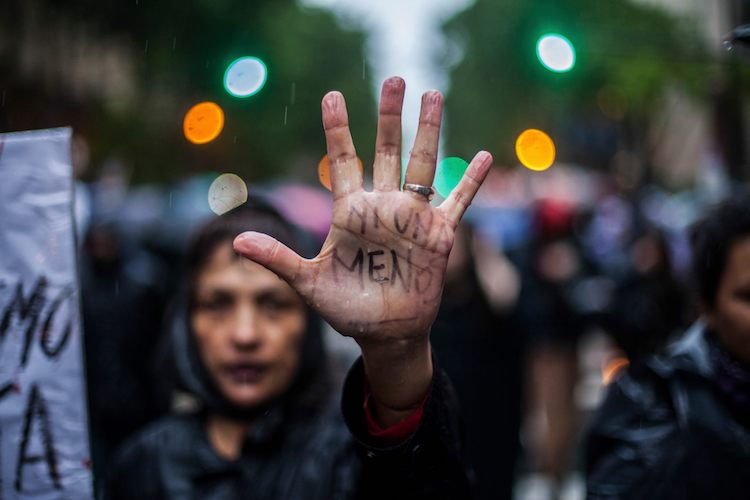
By Helen Hemblade*
This is the seventh in a series of reports on the Vienna UN Conference from January 10-12, 2018, which discussed actions and challenges linked to the Sustainable Development Goal 5 (SDG 5) and in the spirit of SDG 17. The Vienna Liaison Office of the Academic Council on the United Nations System (ACUNS) organized this Conference co-ordinated by Heather Wokusch. – The Editor
VIENNA (IDN) – Violence against women is often considered something private that happens in people’s homes, beyond help of the outside world. We take for granted that victims always have the choice to seek help. We concentrate on how this happened to the victim instead of who committed the act. We fail to address patterns in the crime’s continuation.
Yet, as Ambassador Hermann Aschentrupp of Mexico noted at a recent UN Vienna conference, violence against women is a global issue that knows no borders. The pain this violence causes in the home setting is not only physical but also economic and psychological.
Given the cross-border nature of domestic violence, a coordinated response is required. As a result, the Women Against Violence Europe (WAVE) network of NGOs cooperates with international organisations including the United Nations, the European Union, the Organization for Security and Cooperation in Europe and their respective entities to strengthen efforts to eliminate all forms of violence against women and domestic violence.
Andrada Filip, WAVE Project Coordinator, says that while law enforcement plays an important role in enforcing action that can save women’s lives, police need adequate training to recognise and deal with these situations.
Filip emphasises the necessity of specialist support centres and services for women at risk or who have been victims of domestic violence. She says that while women must be informed about such services, policy makers and governments must also ensure access to them.
Gender-related killing of females (femicide) is the most severe form of violence against women. As Filip noted at the UN Vienna conference, however, the lack of adequate data on this crime hinders the passing of related laws and the creation of effective strategies with which to combat it.
But there has been some progress. In the machismo stronghold of Latin America, femicide is a major public health issue; although 16 countries in the continent have now adopted laws to punish femicide, impunity still exists. The situation is exacerbated by societal disregard and often corrupt authorities. However, activists and families of victims have created the powerful civil movement NiUnaMenos “(Not one [woman] less”) and independent registries which record femicides.
In Europe, various campaigns are working towards best practices. Women’s Aid produced the first independent census on femicide; its database contains information on ‘over one thousand women killed by men in England and Wales since 2009’. Meanwhile, the Spanish NGO Feminicidio.net tracks and records all murders of women in Spain.
In addition, the Academic Council on the United Nations System (ACUNS) has been organizing femicide-related events at the UN offices in Vienna and New York since 2012, successfully adopting two resolutions on the gender-related killing of women and girls. ACUNS has also published eight volumes of its series, FEMICIDE – available in print and online – which features speeches from conferences, research papers from leading experts in the field, and reports by NGOs and governmental agencies.
For its part, the International Alliance of Women (IAW) works to revise practices and laws regarding gender-based violence through the provision of legal aid, counselling, and shelters. At the UN Vienna conference, Treasurer and former IAW President (2004 – 2010) Rosy Weiss noted that the fight against domestic violence has shifted from awareness-raising to implementation. She discussed the importance of integrating gender equality in all levels of education, given its effectiveness in tackling victim blaming.
Echoing the necessity to change attitudes towards domestic violence, Melanie Goisauf, researcher at the University of Vienna, discussed how violence is gendered in the private sphere. She linked violence against women and femicide to gender inequality within society, which results in many women being in subordinate positions throughout their lives. Unequal divisions of labour make it harder for women to leave situations in which they are financially dependent.
The contemporary #MeToo campaign has been instrumental in showing how the mistreatment of women and girls has been normalised, be that through coercive behaviour and gender discrimination or through sexual and physical, sometimes fatal, violence.
As the UN Vienna conference illustrated, violence against women and domestic violence are major public health issues, affecting every country in the world. As such, multilateral and cross-border efforts are required in response.
*Based in Austria, Helen Hemblade is Editor of the FEMICIDE publication series from ACUNS and assists in organising events to raise awareness of the widespread killing of women and girls. She also runs the communications department at a European medical society. [IDN-InDepthNews – 15 February 2018]
Image: The cover of the eighth volume in the ACUNS publication series FEMICIDE. Credit: M.A.F.I.A. (Movimiento Argentino de Fotógrafxs Independientes Autoconvocadxs).
IDN is the flagship agency of the International Press Syndicate.
Facebook.com/IDN.GoingDeeper – twitter.com/InDepthNews











